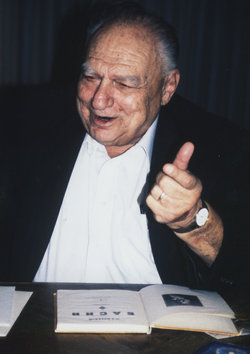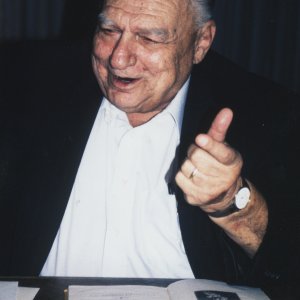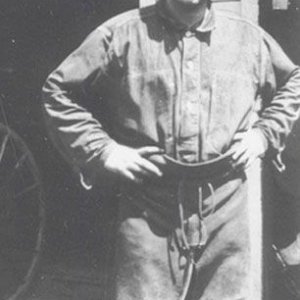- SURNAME
Clurman
- FORENAME
Ruvim Isaac
- UNIT
3 Bn (Orange Combat Team)
- RANK
Technician Fifth Class
- NUMBER
39009628
- AWARD
Bronze Star
- PLACE
Burma 1944
- ADDITIONAL INFORMATION
from San Francisco,California
born 31.10.1918 Harbin,Manchuria,China
son of Isak Grigori and Ethel Rachel (nee Keilis) Clurman (both born Russia
graduated Commercial High School,Harbin
left China 1937
co-owner,No-Delay Market,San Francisco
sales clerk (enlistment)
enlisted 25.6.1941 San Francisco
Mule Corps (blacksmith)
98 Field Artillery Bn (Pack) 1943 (Private)
Merrills Marauders 1.10.1943
discharged 5.11.1945 as Staff Sergeant
ran an import-export business by day and longshoreman by night,San Francisco
moved to Manila,Philippines 1951
Shriro of Philippines,Manila (import-export)
built factory for Johnson baby powder and Brillo cleaning pads
started own company California Manufacturing and sometime pig and cattle farmer in Mindanao
returned to San Francisco 1962
farmer,3-2 Bar Ranch,Yerrington,Nevada 1969
started CIC Investment Corp.,Reno,Nevada (real Estate)
married Miriam Grant (nee Grodsky) 25.1.1946 (born Russia) (1 daughter Irene,1 son Gregory)
changed his first name to Charles during/after WW2
died 8.7.2001 Reno,Nevada
cremated and ashes scattered Lake Tahoe (Nevada side)
Charles (born Ruvim) “Charlie” Isaac ClurmanCharlie was born on October 31, 1918, in Harbin, Manchuria, to Ethel Rachel (Keilis) Clurman (1900-1994) and Isak Grigori Clurman (1889-1938). His parents were Jews who had moved to Harbin separately from Russia to escape that country’s poverty, pogroms and institutionalized anti-Semitism. They were married in Harbin in on October 28, 1917.
Charlie graduated from the Russian-language Commercial High School in Harbin. He received an excellent education but was more interested in sports. He was the junior ice skating champion of Manchuria and participated seriously in gymnastics. The Jews in Harbin had renounced their Russian citizenship to avoid being forced to return to the Communist-run country. They were considered stateless and hoped that the country then known as Palestine would one day become a Jewish homeland.
Charlie recalled in a 1982 interview with his daughter, “We had a Russian education. We had a very good school. Of course we all had fun. We would go to the river. We would row. I used to row. Sail. Swim. Play volleyball, basketball. We had our dances. We had our parties. Then there were the Trumpeldor (Zionist) scouts. We had athletics. We had a skating team. Boys and girls. We were preparing to go to Israel to fight for independence of Israel. China was not our country. We considered ourselves Jewish. We did not even consider ourselves Russian. We were paramilitary. This was in 1933, maybe 1934.”
Charlie left China in 1937, intending to study at the University of California. However, his father, who built apartment houses, raised cattle and owned a lumberyard in Harbin, was abducted and killed in 1938 during the Japanese occupation of Manchuria. The family lost everything, and Charlie no longer had the funds to enroll in school. His mother, brother and sister were trapped in China when World War II began, and Charlie was unable to contact them until the war ended.
After his father died, Charlie started the No-Delay Market in San Francisco’s Mission district with Mark Ross, a friend from Harbin. In June 1941, Charlie joined the United States Army as a blacksmith in the mule corps. He had grown up with horses because most transportation in Harbin was by horse and carriage and his father kept racehorses. It was therefore easy for Charlie to transfer his skills to mules. At Fort Carson in Colorado, his unit trained by marching mules up 14,000-foot Pike’s Peak.
When his company was due to go overseas from Colorado Springs, Charlie insisted on becoming a U.S. citizen before he would agree to leave the country. A judge was brought in specially for this purpose. Charlie’s original first name was Ruvim, the Russian version of the Hebrew name Ruben, but he said it got him into too many fights because people made fun of it. So when he became a citizen, he changed his name to Charles. (“Charlie” was a popular Army nickname.)
Charlie subsequently served in New Guinea, on the Burma Road and in the Philippine Islands. In January 1944, he was among some 3,000 men who volunteered for a dangerous mission with Merrill’s Marauders, officially called the 5307th Composite Unit (Provisional). That special operations jungle warfare unit, nicknamed for its commander, Brigadier General Frank Merrill, fought in Burma deep behind Japanese lines.
In February 1944, the 5307th marched into the Burmese jungle with an initial strength of 2,750 officers and men. Their mission was to wreak havoc on enemy lines of supply and communication, with the ultimate objective of capturing the Japanese air field at the Burmese town of Myitkyina, nearly 800 miles away.
When in August 1944 Myitkyina finally fell to the Marauders and elements of the Chinese army, only 130 officers and men out of the original 2,750 Americans were still fit for duty. Charlie suffered from yellow fever at one point during the campaign but volunteered again to return to battle when he recovered. In recognition of their incredible feat, Merrill’s Marauders received a Distinguished Unit Citation and each soldier of the unit was awarded the Bronze Star Medal.
Charlie was discharged from the Army on November 5, 1945, with the rank of Staff Sergeant. At a Thanksgiving party in San Francisco later that month, he met Miriam Grant (nee Grodsky), who had immigrated from Russia with her family in 1923. They were married on January 25, 1946. Their daughter Irene was born in 1947, and their son Gregory was born in 1948. A month before Irene was born, Charlie brought his mother Roza and brother Izra (Johnny) to San Francisco from Shanghai, where they had spent the war. Charlie’s sister Sylvia immigrated to the new state of Israel.
In San Francisco, Charlie worked two jobs in order to support his family. He ran an import-export business with his friend Mark Ross during the day and worked nights as a longshoreman, unloading ships on the San Francisco docks. One holiday season, he and Mark also ran a Christmas tree lot.
In 1951 Charlie moved to Manila, Philippines, to open an import-export company for the Shriro family, whom he knew from Harbin. The Shriros had similar businesses in many Asian countries, including Japan and Hong Kong. Shriro Philippines was the exclusive Manila agency for Revlon cosmetics and also sold air conditioners, among other things. When import tariffs slowed business, Charlie decided to manufacture goods locally. He built a factory to make Johnson & Johnson baby powder and Brillo cleaning pads.
Eventually Charlie left Shriro Philippines and created his own company, California Manufacturing, with Filipino partners. The company produced many types of pasta as well as jam, peanut butter, mayonnaise and pickles. Charlie, who had only a high school education, would decide on a product, then go back to the U.S. to buy machinery and learn from experts how to manufacture that product. As a sideline, he started a small sewing machine factory as well as a woodworking plant. His wife Miriam designed wooden salad bowls and other decorative items which were made at the plant and exported to the U.S.
Charlie sold California Manufacturing to Best Foods Inc. and moved the family back to San Francisco in 1962 so that Irene and Gregory could attend high school and college in the U.S. Charlie continued to go back and forth to the Philippines on business during those years and started a pig farm and a cattle operation on the southern island of Mindanao. He sold all his interests in the Philippines in the 1970s in response to the repressive, corrupt practices of the Ferdinand Marcos regime.
In 1969, he and several partners bought the 3-2 Bar Ranch in Yerrington, Nevada, near Carson City. In addition to raising cattle, he installed circular sprinklers to grow alfalfa for feed. In the 1970s, he and Miriam moved to Reno to be near the ranch. Charlie also started a real estate company, CIC Investment Corp., in Reno, and Gregory joined him in the business. The company prospered until the early 1990s, when a downturn in financial markets combined with losses sustained by the ranch led Charlie to declare bankruptcy. He spent several years settling his debts but was unable to start another business. Charlie died July 8, 2001, in Reno, Nevada. He is survived by his wife, two children and two grandchildren, Adam Maximillian and Tyler Lancelot.
-- Irene Clurman, November 2014

Charles Isaac “Charlie” Clurman (1918-2001) -...
Charles (born Ruvim) “Charlie” Isaac Clurman Charlie was born on October 31, 1918, in Harbin, Manchuria, to Ethel Rachel (Keilis) Clurman (1900-1994) and Isak Grigori Clurman (1889-1938). His parents were Jews who had moved to Harbin separately from Russia to escape that country’s poverty...
Last edited by a moderator:





